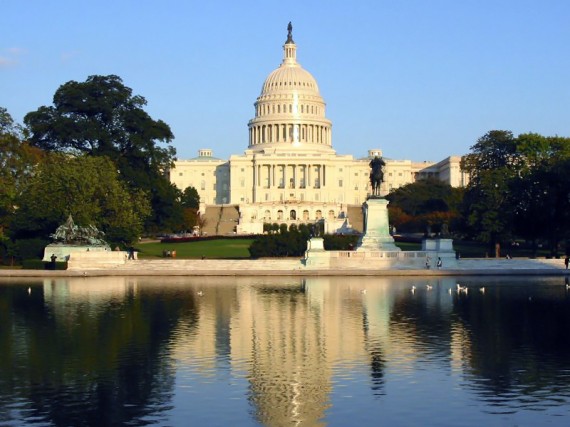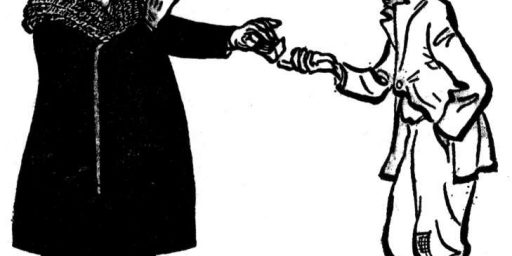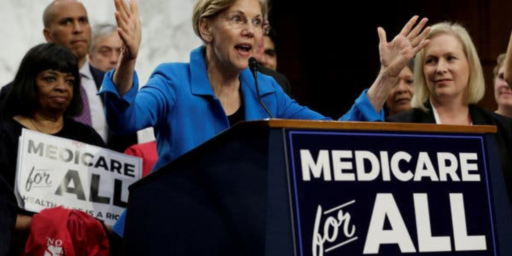Nice Work If You Can Get It
Becoming a Member of Congress can be a very lucrative career.
As much of America continues to languish in a post-Christmas haze, the news media seems to be discovering the not-so-remarkable fact that, for the most part, Members Of Congress are doing a heck of a lot better than the average American:
Largely insulated from the country’s economic downturn since 2008, members of Congress — many of them among the “1 percenters” denounced by Occupy Wall Street protesters — have gotten much richer even as most of the country has become much poorer in the last six years, according to an analysis by The New York Times based on data from the Center for Responsive Politics, a nonprofit research group.
Congress has never been a place for paupers. From plantation owners in the pre-Civil War era to industrialists in the early 1900s to ex-Wall Street financiers and Internet executives today, it has long been populated with the rich, including scions of families like the Guggenheims, Hearsts, Kennedys and Rockefellers.
But rarely has the divide appeared so wide, or the public contrast so stark, between lawmakers and those they represent.
The wealth gap may go largely unnoticed in good times. “But with the American public feeling all this economic pain, people just resent it more,” said Alan J. Ziobrowski, a professor at Georgia State who studied lawmakers’ stock investments.
There is broad debate about just why the wealth gap appears to be growing. For starters, the prohibitive costs of political campaigning may discourage the less affluent from even considering a candidacy. Beyond that, loose ethics controls, shrewd stock picks, profitable land deals, favorable tax laws, inheritances and even marriages to wealthy spouses are all cited as possible explanations for the rising fortunes on Capitol Hill.
What is clear is that members of Congress are getting richer compared not only with the average American worker, but also with other very rich Americans.
While the median net worth of members of Congress jumped 15 percent from 2004 to 2010, the net worth of the richest 10 percent of Americans remained essentially flat. For all Americans, median net worth dropped 8 percent, based on inflation-adjusted data from Moody’s Analytics.
Going back further, the median wealth of House members grew some two and a half times between 1984 and 2009 in inflation-adjusted dollars, while the wealth of the average American family has actually declined slightly in that same time period, according to data cited by The Washington Post in an article published Monday on its Web site.
With millionaire status now the norm, the rarefied air in the Capitol these days is $100 million. That lofty level appears to have been surpassed by at least 10 members, led by Representative Darrell Issa, a California Republican and former auto alarm magnate who is worth somewhere between $195 million and $700 million. (Because federal law requires lawmakers to disclose their assets only in broad dollar ranges, more precise estimates are impossible.)
There are plenty of examples of people of wealth like Issa who are now sitting in Congress, although there used to be a time when most people with fortunes that size could be found in the Senate rather than the House Of Representatives. Partly, of course, this is a reflection of the increased cost of running for office. Issa, for example, represents a Congressional District that takes up large portions of San Diego County in California, which is part of one of the most expensive media markets in the country. Obviously, personal wealth gives one an advantage in a run for office, even if the campaign itself isn’t financed by personal wealth.
Another factor that arguably influences these numbers is that fact that Members of Congress and the Senate tend to come from professions that are associated with above-average wealth. In the 111th Congress, the legal profession contributes some 42% of the 535 Congressman and Senators, 57% came to Congress from previous positions in politics at the state or local level, and roughly 37.5% came to Capitol Hill from the business world. Meanwhile, only some 32 Members of Congress (12%) come from professions that could fairly be described as “blue collar.”
Even if you don’t enter Congress all that wealthy, there’s a fairly good chance that you’ll do pretty well for yourself if you stick around enough:
Once in Congress, members benefit from many financial perks unavailable to most Americans. Beyond a base salary of $174,000 — an increase of about 10 percent since 2004, somewhat less than inflation — members get extra pay for senior posts and generous medical and pension benefits, as well as accouterments of power often financed by taxpayers or their campaigns. .
(…)
In a study completed this year, Mr. Ziobrowski at Georgia State and his colleagues found that House members saw the stocks they owned outperform the market by 6 percent a year. Their research from several years ago found that senators did even better, at 12 percent above average. The researchers attributed the performance to a “significant information advantage” that lawmakers hold by virtue of their positions and the fact they are not bound by insider-trading law.
However, a separate study last year by researchers at Yale and the Massachusetts Institute of Technology found that the portfolios of lawmakers actually performed somewhat worse than average investors. It found that members did do better when investing in companies in their home districts or associated with campaign donors — suggesting that they benefited from their political connections — but still not as well as the average investor.
While concerns go back decades about lawmakers trading on confidential information, the issue drew renewed attention with a new book on the topic, “Throw Them All Out” by Peter Schweizer, and a “60 Minutes” report in November. Both linked high-level briefings that Congressional leaders received on the 2008 financial crisis and on health care to their purchase and sale of certain stocks.
And, of course, if you manage to stay in Congress long enough you’re likely to find the road to future income paved pretty nicely thanks to all those connections you’ve made over the years.
The New York Times piece linked above, as well as a much longer piece published by The Washington Post both explore the question of the extent to which the disparity between Members of Congress and their constituents, along with the fact that they, like nearly all Federal Government employees have been largely shielded from the impact of the Great Recession impacts the extent to which our political institutions are truly representing the interests of the public. Can people who have no real experience with economic hardship, and little concern that their job is in danger given the rate at which incumbents are re-elected, truly represent people who are wondering if they’ll be able to send their kids to college?
It’s an interesting question, and it does bring up the rather glaring fact that the legislature has strayed fairly far over the past two centuries from the perhaps unattainable ideal that the Founders had of the citizen legislator. It’s the odd Member Of Congress who comes to Congress for a few years and then leaves voluntarily. Even candidates who ran for office in the 1990s on the promise that they’d voluntarily limit themselves to a specific number of terms miraculously found a way to change their mind when the time to resign was around the corner. It’s easy to understand why. For all the complaining you hear from Capitol Hill about how difficult it is to constantly run for office, the fact is that being in Congress can be a pretty sweet life. Not only is there a nice salary and generous benefits, but all of a sudden you find people wanting to talk to you can curry favor with you, and television reporters who want to put you on the air. It can all be pretty seductive, I’d imagine, and it’s easy to see why people get caught up in it so easily. The problem, of course, is that these are the same people who are voting on legislation that ends up having a massive impact on the lives of people they can no loner really relate to, although they do love to use “the people” for their own political purposes.
There is a counter-argument here, of course. None of these people would be in office if people didn’t vote for them. Throwing the bums out would be very easy if people would just get it into their mind to do it. Each Election Day, though, we learn that there’s not much reality to that rhetoric. So, in some sense, we get the Congress we deserve.







Doug,
Are you actually going to engage in analysis here? Or just your usual stenography? Because you compeletly glossed over the WaPo article’s great profiling on “Blue Collar” Reps. Specifically, how their experiences of poverty translated into an understanding the plight of the working poor beyond usual GOP sloganeering on people using their “bootstraps”.
For example, there’s Gary Meyers, a rep elected as a Republican in 1975:
I think it is unremarkable to say that Gary Meyers in unelectable in today’s GOP.
I think the emphasis of the NY Times article, that the gap between congress and the people they represent is widening, is the correct one.
It is not only wrong, but a great disservice, to dismiss that as business as usual.
(Probably what you really mean in your closing is that if this is the result the market produced, it must be optimal. As a simplistic, closed-circle, argument that one is hard to beat.)
“throwing them out” would be much more likely if the 1% didn’t have a virtual stranglehold over elections;
Given the nearly unlimited sums of advertising and mass mailing money that can be brought to bear upon anyone who dares to challenge the status quo, it really shouldn’t mystify anyone that the vast majority of elected officials meekly go along to get along, and become rich in the process.
As I have pointed out elsewhere, the legislators, lobbyists, and media all are in the same class; they graduated from the same universities, live in the same neighborhoods, eat at the same restaurants, send their kids to the same schools, and have nearly identical outlooks on the issues.
For them, the most pressing issues of the day ARE capital gains rates, not unemployment rates; stock market performance, not public transportation performance; access to the waiting list for the right preschool, not access to health care;and the availability of such a thing called a “Thermomix” not the availability of healthful food.
So we have this interlocking and self-reinforcing aristocracy where special interests reward legislators with campaign funds , who reward journalists with access and information, who reward interest groups with blind eyes, who then begin the cycle all over again.
Those of us who protest this state of affairs are scolded and told to “work within the system”.
We don’t want to work within the system- the system itself is what we are protesting.
It will be interesting to see what future historians write about the current Republican Party.
It seems to be so transparently operating in the interests of the greedy rich, yet it gets the votes of roughly half of all America voters.
Its appeals to racists doesn’t completely explain its bizarre alliances.